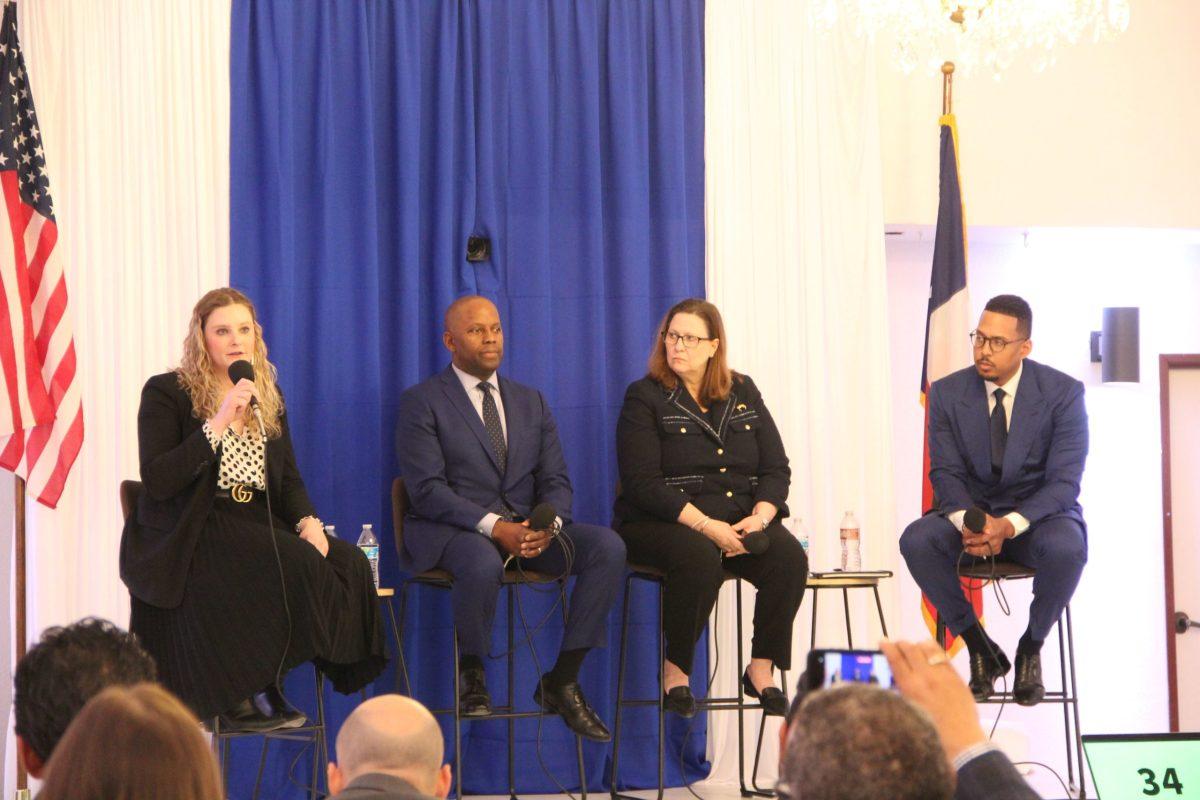Four democratic candidates dug into policy issues at the first Texas 32 congressional debate on Jan. 18, 2024 as each vie for the seat Rep. Colin Allred will leave behind in his bid for senate. Candidates disagreed on the humanitarian crisis in Gaza and the recent U.S. bombing of Yemen; members of UTD’s Students for Justice in Palestine chapter called for a ceasefire and were escorted out by police.
Brian Williams, Rep. Julie Johnson, Justin Moore and Callie Butcher were the only candidates invited to speak, out of 10 running in the Democratic primary. Congressional District 32 includes the entirety of the UTD campus as well as parts of Dallas, Collin and Denton counties. Williams works as a trauma surgeon, Butcher and Moore are both experienced lawyers, and Johnson currently serves in the Texas House of Representatives. The candidates were asked for their perspectives and policy approaches to immigration, the Israeli-Palestinian conflict, gun control, abortion and healthcare, recent American missile strikes against Yemen, economic inequality and how to overcome gridlock in Congress.
While the candidates were responding to a question about the humanitarian crisis in Gaza, members of SJP and other community members raised signs which spelled out “CEASEFIRE NOW.”
“I would love to see a ceasefire,” Johnson said. “We have to have compassion for all people, but Israel has a right to defend itself and Hamas has to go.”
Johnson and Williams expressed support for Israel’s military actions while indicating a need for a ceasefire once Hamas is defeated. Butcher and Moore emphasized the need for humanitarianism, the need for a ceasefire and an opposition to what they called a genocide unfurling in Gaza. Moore said that Zionism in Israel has been as detrimental as white nationalism has been within the U.S.
“We call out the hypocrisy of representatives like Julie Johnson. What she is saying by immediately following that [pro-ceasefire] sentiment with support for Israel’s right to defend itself is an argument that has been used to justify the genocide,” said Nour Saad, UTD graduate student and SJP board member. “We do not stand for that incredibly dangerous and hypocritical sentiment which allows for the normalization of the genocide.”
UTD students also interacted heavily with the debate during the closing statements. As Johnson gave her final remarks, a UTD SJP member stood up and interrupted Johnson by yelling “Are you saying that Israel has a right to defend itself?” The other activists sitting in the same row joined in and began chanting “ceasefire now” while holding signs as police arrived to escort them out of the building.
“America has to serve as the defender of democracy around the world,” Williams said. “And, like the Houthis, we are seeing threats to democracy everywhere.”
Johnson and Williams expressed support for the American missile strikes against Ansar Allah in Yemen, while Butcher and Moore opposed Biden’s approach in this situation and emphasized the need for diplomacy first.
“We don’t have a good record in the Middle East,” Butcher said. “How can we build trust if we continue to violently interfere?”
When discussing the need for stronger gun control legislation, Williams called out Johnson on what he called her support of Republican gun legislation. Johnson rebutted by emphasizing her 0% rating from the NRA and her record of support for stronger gun legislation. Butcher emphasized the need for universal background checks and measures like assault weapon bans which she specified were not a novel concept. Moore discussed the need for both a legislative and a “holistic” approach — encouraging communities to police gun ownership in their own area. Moore said he has seen this strategy succeed in Chicago where he worked to reduce violence and promote gun buyback programs.
“In Chicago, I organized a gang peace rally,” Moore said. “We challenged rival gangs to a ceasefire. Not only did they stop shooting each other, but they marched together against the proliferation of illegal guns in our streets.”
All four candidates said they wanted to increase access to abortion and contraceptives and make healthcare more accessible; Johnson discussed restructuring the process of medical debt, Butcher spoke about implementing Medicare for all and protecting gender-affirming care and Moore discussed making healthcare a human right.
“Healthcare should be a right that everyone has,” Moore said. “Healthcare isn’t just a medical issue, but also a financial one. U.S. healthcare creates this divide between the haves and the have-nots which carries through generations. We need healthcare that is affordable and accessible to everyone.”
Williams again called out Johnson, this time on what he called her support for bills which restricted access to abortion and healthcare in Texas. VoteSmart’s profile on Johnson shows she has a history of supporting abortion and a history of working to improve healthcare access in Texas.
“We need to enshrine a right to bodily autonomy,” Butcher said. “Your healthcare shouldn’t depend on what state you live in, and you should not be forced to flee the state you live in.”





